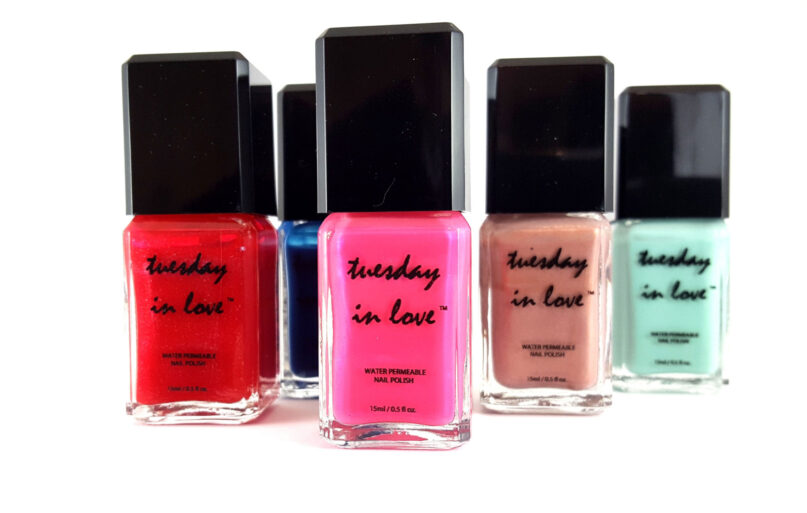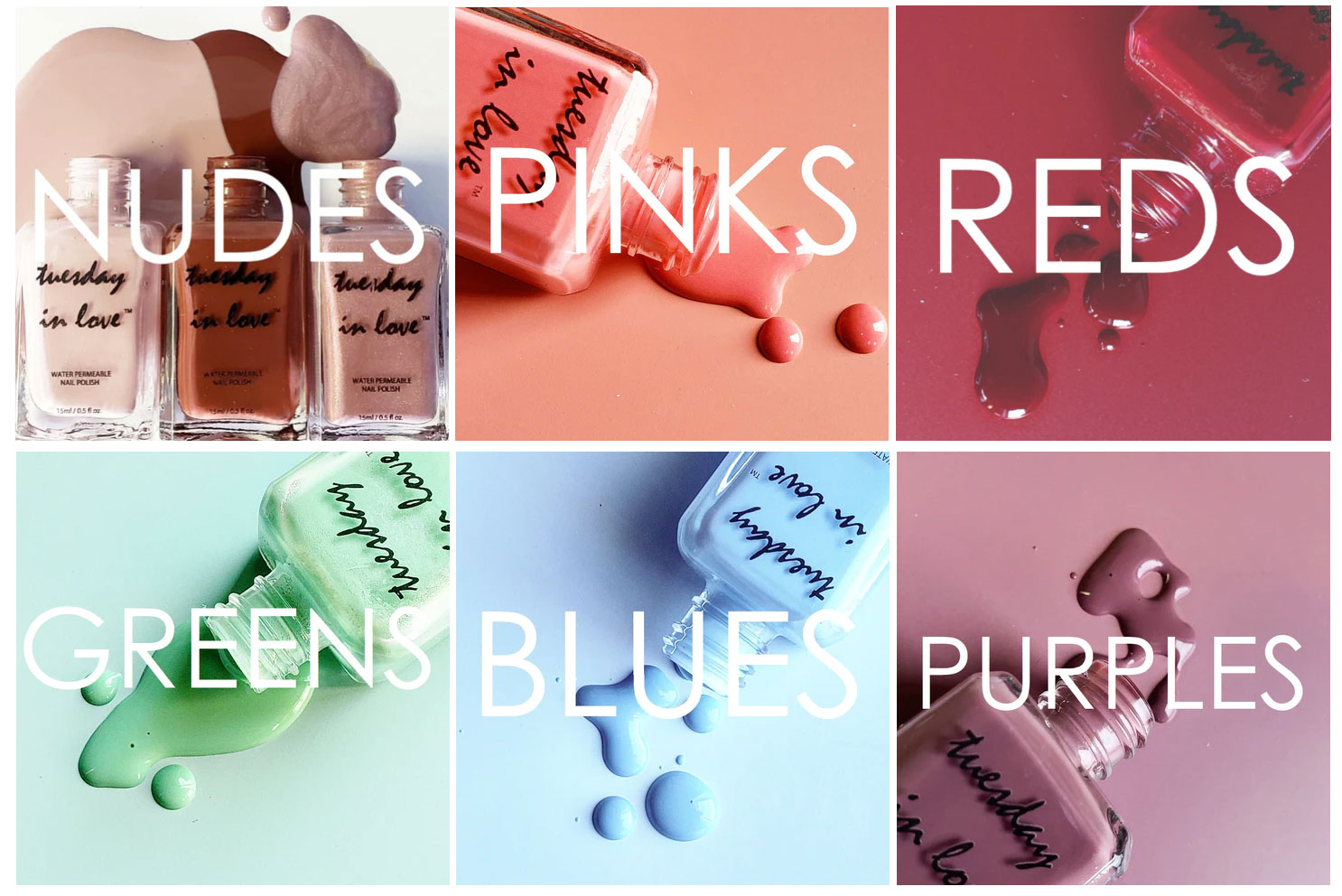Halal nail polish raises complex discussions among Muslim consumers
The halal cosmetic market is growing rapidly, but many customers remain skeptical.
(The Arabs Caught the OU and Moshe Heinemann dreaming in Black & White - could be Yenta Yachne the Mikve Lady's job does not require nail polish remover - Water Soluble Dye May Not Be Considered a Chatzizah) Y:D 198-17, Chut Shani Nidah 198- pg. 309, Rema ibid -1, L’torah U’lhorah 7 pg. 27 (PM)
Rabbi Moshe Feinstein ---"The Mishna in Shabbat 65a teaches that a woman is permitted to wear a small piece of cotton in the ear into a public domain on Shabbat. The Gemara explains that any item which is a chatzitza may not be worn into the public domain on Shabbat. It would seem, accordingly, that a piece of cotton is not a chatzitza. Rav Moshe explains that the reason for this is as follows. He says that there are two types of chatzitzot. The first is a Chatzitza which actually attaches to the skin and impedes the contact of the skin with water. Examples of this include nail polish and ointments." PM
SEE TUR YORAH DEAH: יורה דעה הלנות טנילה קצח
file:///C:/Users/Owner/Downloads/yd4_138-1.pdf

(RNS) — On her TikTok, Maham Ayaz, also known as @eggdelivery, regularly tests the water permeability of halal nail polish. In a video that received 27,000 likes, Ayaz lay small portions of nail polish film on a paper towel before applying six to seven drops of water to each.
After a five-minute wait, she announced the verdict: The paper towel remained dry. None of these products let water seep through despite advertising to the contrary.
The flow of disappointed users in the comment section revealed the stakes: Making sure water can reach the surface of the nail tip at any time, even with a manicure, is important to many Muslim consumers.
When performing wudu, the ritual purification before each of the five daily prayers, some claim the cleansing isn’t complete unless the water reaches all parts of the face, hands, arms and feet. Including the nails.
Tapping into this booming market, many nail polish companies developed water-breathable formulas in the past 10 years, also known as wudu-friendly nail polish. But there is yet to be an official standard in the halal certification industry to rate the efficiency and reliability of these products.
For Imam Mansoor Rafiq Umar, the CEO and president of Halal Watch World, a halal certification organization, labeling a nail polish as halal is a tricky and complex process.
“It’s very difficult for any company to claim that something can permeate it. I would love to see all the scientific data and papers to be able to show that,” he said.
In 30 years of business, Halal Watch World only certified one nail polish brand as halal for its clean composition, as it didn’t include any prohibited ingredients, such as alcohol, explained Umar. For now, the company refuses to grant wudu-friendly certificates, claiming that existing water permeability tests aren’t convincing enough.
For Umar, certifications should clearly distinguish between the halal composition and the wudu-friendliness of the nail polish. He said this could help strengthen Muslim consumers’ trust in halal nail polish brands. Since the use of the term halal in this context can be misleading, Umar believes such products can’t be considered haram, or sinful in Arabic.
“I think the categorization is actually problematic. You can’t deem something as halal if you can’t make wudu with it. That’s not really a proper classification,” he said.
Dr. Umar Dar, the CEO and founder of the halal nail polish brand Tuesday in Love, also thinks the halal certification industry should agree on new standards for halal nail polish.
“When it comes to the halal certification industry, there is very little to no central and authoritative organization,” he said.
Dar first got interested in the halal nail polish industry in 2014, when he spent hours testing the water permeability of such products in his kitchen. After months of testing samples of various brands, Dar realized none let water seep through due to the use of nitrocellulose. This compound, used in paint, lacquer and most nail polish, hardens when it dries and creates a solid layer on the nail.
Even if many brands add another chemical in their formulas to alter the nitrocellulose base, it isn’t enough to change the original properties of nail polish and make them completely water-breathable, said Dar.
“I had a chemistry background, I examined it closely, and I was like, this is just a marketing scam. … Breathable nail polish is literally just a regular nail polish jacked up in price,” he said.
Dar developed a water-breathable complex certified by the Canadian Halal Certification and the Islamic Society of North America, and he put a patent on it. He regularly challenges his clients to rate its efficiency with homemade tests.
“We tell our customers: Look, it should be simple enough for you to even do this at home,” he said.
Dar called out halal nail polish brands and the organizations that certified them on his brand’s YouTube channel and TikTok.
Javed Younis co-founded a leading brand in the industry, Maya Cosmetics, a Chicago-based company. He recognized there is a specific way of using these products to ensure efficiency, suggesting consumers let water run on their hands and create enough pressure by rubbing their fingertips.
After an audit that included the company’s manufacturing, their subcontractors, and a battery of water-permeability tests using coffee filters, Maya Cosmetics products have been certified halal by the Islamic Food and Nutrition Council of America and the IDCP, a Filipino certification organization.
“It’s not just our opinion in that saying this is a safe product, an independent certification body approved the product,” said Younis.
Ever since he founded the company in 2016, Younis said, he has encountered a lot of skeptical clients.
“Despite having certification, there is still a portion of the Muslim population that does not accept it as valid. We are OK with that; that is perfectly acceptable,” he said.
Expected to grow steadily in Asia-Pacific and Muslim-majority countries, the halal cosmetic global market represented $30 million in 2020, according to a recent report by Allied Market Research. Younis said halal cosmetic products are particularly appreciated in countries with a trendy young Muslim population, such as Malaysia, Singapore, South Africa and the United Kingdom. Jewish and vegan consumers are also a growing market.
This growing interest should force halal certification organizations to take the problem seriously, according to Dar, who believes they are trying to avoid conversations on the topic or simply refusing to take positions on these products.
“I think, that’s where a lot of our younger generation gets very frustrated. Just because it’s technology and it’s new doesn’t mean you should dismiss it,” he said.




